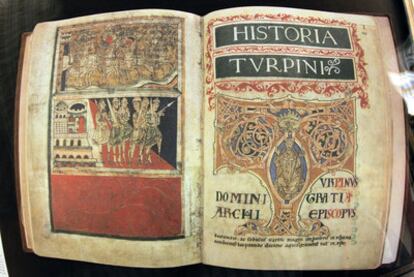Spain no longer on art robbery blacklist
Inventories and tightened security have curtailed trade, despite loss of Santiago codex
In recent years, Interpol lists of significant art robberies have tended to highlight Italy as the main landscape of missing masterpieces. The theft last week of a 12th-century Codex Calixtinus from the Santiago de Compostela Cathedral represented the first major heist of an historical piece of patronage since the 1989 robbery of two priceless Velázquez paintings from the Royal Palace in Madrid. The whereabouts of the artworks is still unknown.
Alongside these two Velázquez pieces, the other great mystery of works of art that have vanished without trace in Spain dates to 2006, although the case is one not so much of robbery as plain disappearance. The Reina Sofía Museum made public that four blocks of 38 tons apiece, which constituted celebrated artist Richard Serra's Equal Parallel/Guernica-Bengasi , had vanished from the warehouse of a company contracted to store it. Since 2009, the museum has exhibited a copy, made by Serra himself.
Legends aside, the robbery of artworks in Spain is, according to experts, practically an anecdote in itself. The difficulty of moving on a recognizable artwork, improved cataloguing of historical heritage and tighter security in cathedrals, churches and museums has had a dissuasive effect. The days when robberies were counted in dozens per annum are long gone.
The worst period for Spanish heritage was between 1975 and 1981. The Oviedo Cathedral was plundered by thieves who destroyed three Medieval treasures, the Cross of the Angels, the Cross of Victory and the Arc of the agates. In 1979 the 10th-century altarpiece of the Shrine of San Miguel de Aralar in Navarre was stolen. It was recovered, already in pieces, in France and Italy two years later. Another of the most famous robberies in Spain this decade was that of four maps, taken from the 1482 edition of Ptolemy's Cosmography by César Ovilio Gómez Rivero, an authorized Uruguayan researcher who spirited the pages out of the National Library in Madrid.

Tu suscripción se está usando en otro dispositivo
¿Quieres añadir otro usuario a tu suscripción?
Si continúas leyendo en este dispositivo, no se podrá leer en el otro.
FlechaTu suscripción se está usando en otro dispositivo y solo puedes acceder a EL PAÍS desde un dispositivo a la vez.
Si quieres compartir tu cuenta, cambia tu suscripción a la modalidad Premium, así podrás añadir otro usuario. Cada uno accederá con su propia cuenta de email, lo que os permitirá personalizar vuestra experiencia en EL PAÍS.
¿Tienes una suscripción de empresa? Accede aquí para contratar más cuentas.
En el caso de no saber quién está usando tu cuenta, te recomendamos cambiar tu contraseña aquí.
Si decides continuar compartiendo tu cuenta, este mensaje se mostrará en tu dispositivo y en el de la otra persona que está usando tu cuenta de forma indefinida, afectando a tu experiencia de lectura. Puedes consultar aquí los términos y condiciones de la suscripción digital.








































